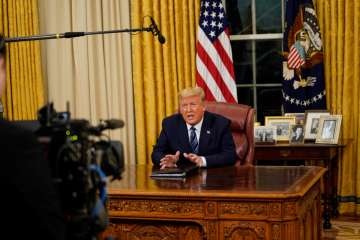Trump hails COVID-19 research as coronavirus vaccine makes 1st clinical trial
COVID-19 has upended the world’s social and economic fabric since China first identified the virus in January, with broad regions shuttering schools and businesses, restricting travel, canceling entertainment and sporting events, and encouraging people to stay away from each other.

The first shots as an experimental coronavirus vaccine were tried by some US researchers on Monday, leading off a worldwide hunt for protection even as the pandemic surges. An anxiously awaited first-stage study of a potential COVID-19 vaccine has been developed in record time after the new virus exploded out of China and fanned out across the globe. With careful jabs in the arms of four healthy volunteers, scientists at the Kaiser Permanente Washington Research Institute in Seattle tried the vaccine on few coronavirus patients.
“We’re team coronavirus now,” Kaiser Permanente study leader Dr. Lisa Jackson said on the eve of the experiment. “Everyone wants to do what they can in this emergency.”
At a news conference, President Donald Trump praised how quickly the research had progressed. Taking to Twitter, Trump said, "Yesterday I spoke with the great American Grocers and Supply Chain Executives. We are confident that supply will continue to meet demand nationwide. These beacons of our community will remain open for you, no matter what. We are working hard to remove any barriers to that effort!"
"I ask all Americans to band together and support your neighbors by not hoarding unnecessary amounts of food and essentials. TOGETHER we will stay STRONG and overcome this challenge," Trump wrote in another tweet.
Coronavirus vaccine: How patients responded to treatment
“We all feel so helpless. This is an amazing opportunity for me to do something,” Jennifer Haller, 43, of Seattle said before getting vaccinated. Her two teenagers “think it’s cool” that she’s taking part in the study.
After the injection, she left the exam room with a big smile: “I’m feeling great.”
Three others were next in line for a test that will ultimately give 45 volunteers two doses, a month apart.
Neal Browning, 46, of Bothell, Washington, is a Microsoft network engineer who says his young daughters are proud he volunteered.
“Every parent wants their children to look up to them,” he said. But he’s told them not to brag to their friends. “It’s other people, too. It’s not just Dad out there.”
Coronavirus vaccine: What doctors and researchers said
Monday’s milestone marked just the beginning of a series of studies in people needed to prove whether the shots are safe and could work. Even if the research goes well, a vaccine would not be available for widespread use for 12 to 18 months, said Dr. Anthony Fauci of the U.S. National Institutes of Health.
Fauci noted that 65 days have passed since Chinese scientists shared the virus’ genetic sequence. He said he believed that was a record for developing a vaccine to test.
This vaccine candidate, code-named mRNA-1273, was developed by the NIH and Massachusetts-based biotechnology company Moderna Inc. There’s no chance participants could get infected because the shots do not contain the coronavirus itself.
It’s not the only potential vaccine in the pipeline. Dozens of research groups around the world are racing to create a vaccine against COVID-19.
Another candidate, made by Inovio Pharmaceuticals, is expected to begin its own safety study next month in the U.S., China, and South Korea.
The Seattle experiment got underway days after the World Health Organization declared the new virus outbreak a pandemic because of its rapid global spread, which has infected more than 169,000 people and killed more than 6,500.
COVID-19 has upended the world’s social and economic fabric since China first identified the virus in January, with broad regions shuttering schools and businesses, restricting travel, canceling entertainment and sporting events, and encouraging people to stay away from each other.
Starting what scientists call a first-in-humans study is a momentous occasion for scientists, but Jackson described her team’s mood as “subdued.” They’ve been working around-the-clock readying the research in a part of the U.S. struck early and hard by the virus.
Still, “going from not even knowing that this virus was out there ... to have any vaccine” in testing in about two months is unprecedented, Jackson said.
Some of the study’s carefully chosen healthy volunteers, ages 18 to 55, will get higher dosages than others to test how strong the inoculations should be. Scientists will check for any side effects and draw blood samples to test if the vaccine is revving up the immune system, looking for encouraging clues like the NIH earlier found in vaccinated mice.
“We don’t know whether this vaccine will induce an immune response or whether it will be safe. That’s why we’re doing a trial,” Jackson stressed. “It’s not at the stage where it would be possible or prudent to give it to the general population.”
Most of the vaccine research underway globally targets a protein aptly named “spike” that studs the surface of the new coronavirus and lets it invade human cells. Block that protein and people cannot get infected.
Researchers at the NIH copied the section of the virus’ genetic code that contains the instructions for cells to create the spike protein. Moderna encased that “messenger RNA” into a vaccine.
The idea: The body will become a mini-factory, producing some harmless spike protein. When the immune system spots the foreign protein, it will make antibodies to attack — and be primed to react quickly if the person later encounters the real virus.
Also Read | Coronavirus: People consume cow urine in Kolkata
Also Read | Coronavirus: Air India pilots seek urgent financial aid